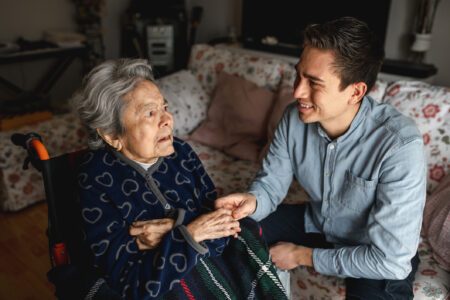
Caring For Caregivers: Support for Families Impacted by Dementia
Caregivers are a lifeline for people living with dementia. But who is the lifeline for caregivers?
The Caring for the Caregivers program at UT Health San Antonio serves as a resource and support for patient caregivers and families through evidence-based education and research.
“We envision a community where family caregivers are valued, respected, and supported with compassion. We are committed to values of social justice, collaboration, and family-centeredness in research and practice,” according to the Caring for Caregivers webpage.
Learn about the programs, events, and tools that can help your family!
Latino Caregivers by the Number
Latinos are greatly impacted by dementia.
About 13% of Latinos who are 65 or older have Alzheimer’s or another form of dementia, according to a Salud America! resource
Caregivers also play an important role within the Latino community.
One in five Latino adults (20%) are providing unpaid care to an adult with health issues or a disability, according to a 2020 survey conducted by AARP.
The same survey reports that Latino adults make up 17% of family caregivers, totaling in 8 million Latino adults.
The National Institute of Health reports that 25% of Latino caregivers are caring for someone with dementia.
“Many caregivers within the Hispanic/Latinx community don’t realize they are caregivers or don’t identify with the term. Some think they are just doing what they should for their families or loved ones. However, this is a full-time job requiring adequate conditions to fulfill tasks, live in peace and develop fully—either as caregivers or in other roles in life,” as mentioned by the American Society on Aging.
With many Latino caregivers dedicating their time, effort, and finances to ensure the right care for their loved ones, helpful resources are essential.
Caregiver Programs
There are several programs across the nation that provide help to caregivers such as Family Caregiver Services through the California Department of Aging and the National Family Caregiver Support Program which focuses on providing grants to states and territories to fund a range of supports that assist family and informal caregivers.
In South Texas, where most of the population is Latinos, enrichment and engagement programs are available for caregivers and families in need of support through Caring for the Caregivers at UT Health San Antonio.

“The Caring for the Caregiver program was founded through a community academic forum. So, the community said, you know, ‘Caregiver resources that exist, they require us to attend like weeklong, sometimes two weeklong courses, we can’t do that.’ So the essentials of caregiving kind of came out of that,” said Sara Masound, community outreach coordinator for Caring for the Caregiver.
Memory Cafés are held monthly online and quarterly in-person with the goal of getting people living with dementia and family caregivers to laugh, learn, and socialize.
The Texas Memory Cafe Network consists of Memory Cafe coordinators, community partners, and families living with dementia who work together to improve the quality and quantity of Memory Cafes in Texas. Caregivers can view the calendar for more details on the latest program events.
The Caregiver Reassurance Program pairs UT Health San Antonio students with family caregivers to connect via phone over a period of 3-6 months.
Family caregivers can socialize with “dementia friend” students and receive any bilingual information that they may need.
“[Students] develop sort of like little friendships and they fill out a pretty long call log for every call. And then I follow up and refer them to resources,” Masound said. “And we have two people who make the phone calls in Spanish, so if we have somebody who prefers to speak in Spanish, we can assign them to that.”
Caregivers interested in receiving calls can fill out a contact form.
Educational programs are also offered like the Essentials of Caregiving classes.
These classes focus on providing support to caregivers of people living with Alzheimer’s or related dementias like “Understanding a diagnosis of dementia” and “Legal and financial planning.”
Register here for the program.
Counseling Opportunities
The Biggs Institute for Alzheimer’s and Neurodegenerative Diseases also offers counseling for patients and their families.
“I see our families, caregivers, even the patients themselves after diagnosis, and even during diagnosis, just to talk through the adjustment and some of the difficulties that come with that along with anxiety and depression,” said Melissa Flores, LPC and counseling and community programs coordinator at the Biggs Institute at UT Health San Antonio.
Patients and caregivers can take advantage of the many services offered including:
- Individual, couple and family therapy
- Crisis intervention
- Future care planning
- Referrals for long-term care
- Guidance on programs for individuals coping with a diagnosis
- Support groups
“All of our community programs, support groups, the events are open to the community to anyone, even if they’re not a part of our clinic, and they’re all free,” Flores said.
For more information or to schedule an appointment, contact Melissa Flores at 210-450-8506
How Caregivers Can Help Their Familia and the Next Generation
We know dementia hurts many of our abuelos, moms, dads, and others we love.
Clinical trials help us fight for our familia.
Clinical trials are studies that help researchers learn more to help slow, manage, and treat Alzheimer’s and dementia for current and future family members. But without Latino volunteers for clinical trials, the benefits may miss this group.
Visit our clinical trials page to find a clinical trial, read about hero volunteers, and more!
“Latinos in clinical trials are not only helping themselves, but they’re also building a future with better treatments that can help their families in the future,” said Dr. Amelie Ramirez, director of the Institute for Health Promotion Research and Salud America! at UT Health San Antonio, who is creating new ways to urge Latinos to volunteer for clinical trials thanks to a grant from Genentech, a member of the Roche Group.
The post Caring For Caregivers: Support for Families Impacted by Dementia appeared first on Salud America.

